|
DISC 11
Drug-taking equals drama, at least if movies and TV are to be believed. In a world in which deviations from the perceived norm are all that is required to provide Vladimir Todorov's famed disruption of the equilibrium to kick the narrative into gear, any character who becomes hooked on drugs is a shortcut to trouble. They'll become a gibbering slave to their increasing dependency, put the wellbeing of friends and family second to their need for the next hit, and will eventually trigger a major crisis when they inevitably overdose or attempt to go cold turkey.
As anyone who has experience in this area will probably know, the reality of drug taking is often very different. If addiction takes hold and you're able to keep the supply of your drug of choice coming, then the whole process of taking the regularly required hit becomes part of your daily routine. You want an example? Well, it's been over twenty years now so I think I'm safe to share this one, especially if I modify a few small details. A long time ago, someone close to me was a regular user of a whole cocktail of drugs, but never showed any outward signs that he was taking anything and really was one of the nicest guys I have ever known. One day, the two of us were visiting a friend – let's call him Steve – who was completely unaware of my friend's habit and would have taken a very dim view of it had he known. Steve was working late and had given me a spare key to let ourselves into his flat and wait for him, and while we did so my friend calmly produced a small bag of cocaine and laid it out in a line on the kitchen worktop. No sooner had he done so than we heard Steve stick his own key in the front door. My friend did not panic, just leant down and snorted up the coke, then as Steve walked in he casually wiped his nose, turned and stuck out his hand in greeting as calmly said, "Hi Steve. How you doing?" as if this was the most ordinary thing in the world. Which to him it was, of course.
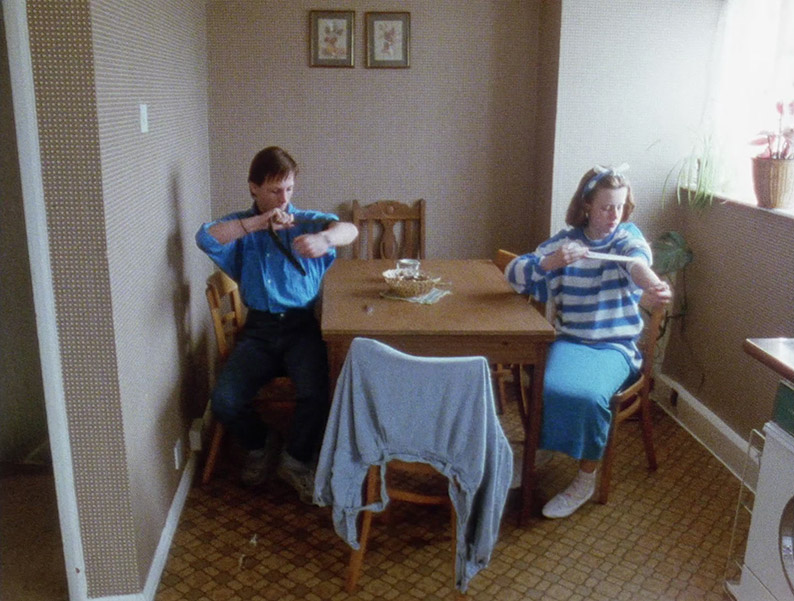
Alan Clarke's 1987 Christine, made as part of the BBC's Screenplay series, was the first and to this date only film I've seen that absolutely nails this largely unaddressed aspect of chemical addiction, and does so with a minimalism that borders on brilliance. Right from the off Clarke grounds us in the ordinary, as young couple Christine and Eddie move around their flat and chat about the sort of trivial aspects of daily life that we all indulge in at one point or another. Then without breaking their stride or interrupting their conversation for a second, they fill their syringes, tap out the air bubbles and sit down to shoot up. The only untoward element here is that both Christine and Eddie seem far too young to be out on their own and sharing a flat. It turns out they're not, at least not in the usual sense.
They're also not the only ones using the unspecified product in question. As the camera follows Christine to a number of local houses, it becomes clear that she is funding her own habit by selling drugs on to others her own age. In this respect she provides an unusually friendly door-to-door delivery service, one that includes watching over her customers as they shoot up (three times during the film she offers a slightly concerned, "Are you alright?") and carefully disposing of any drug paraphernalia to avoid alerting parents to their teenage son or daughter's secret habit.
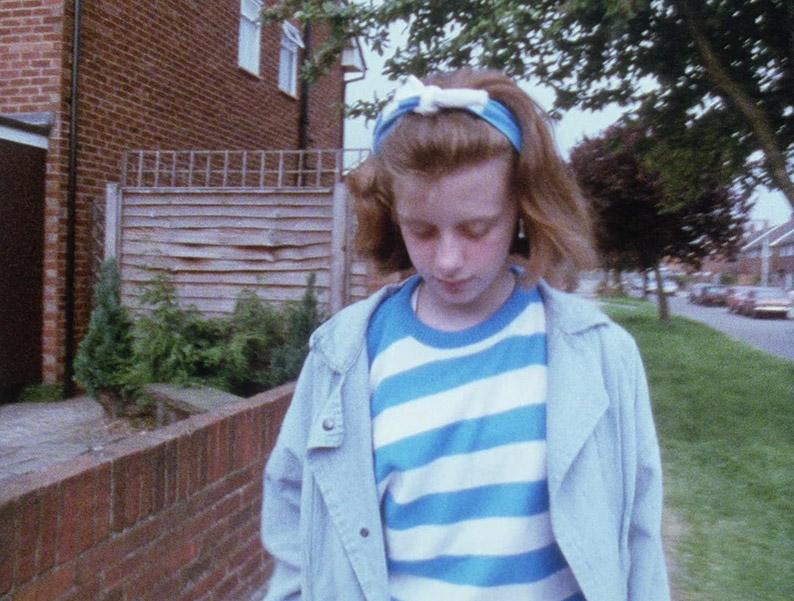
The most shocking aspect of Christine is that nothing in it actually shocks. Only when you step back and seriously consider just what you have been watching, the fact that something as ultimately self-destructive as drug addiction has become for the young users here as everyday an activity as making a cup of tea, does it really hit home. In this respect Christine does for drug addiction what Elephant does for the killings in Northern Ireland – its approach may be less obviously confrontational, but its effect is ultimately every bit as devastating.
Adapting a play into a film for cinema or television is always fraught with potential pitfalls, as a work that was created for one medium is in no way guaranteed to translate effectively to another. Being slavishly faithful to a play can lead to the resulting film being described as stage-bound or criticised for being unable to disguise its theatrical origins, but open it out and you risk accusations of having betrayed your respected source material. This can be further complicated if the original production broke with convention in a manner that would be considered unique to the medium of theatre and that could not literally be translated to film.
Such was the case with Jim Cartwright's Road, a series of telling and interconnected glimpses into the lives of people living in a single street in a severely deprived corner of an unnamed Lancashire town over the course of a single evening. Employing a junk collector named Scullery as a narrator and guide, interspersed with long monologues and designed in a way that encouraged audience interaction with the promenade set, this is not a play that at first glance lends itself to cinematic interpretation. Enter Alan Clarke and cameraman and master Steadicam operator John Ward, a collaboration that gave birth to a series of films for television that followed characters on the move in long unbroken takes that came to be known as Clarke's 'walking films'.
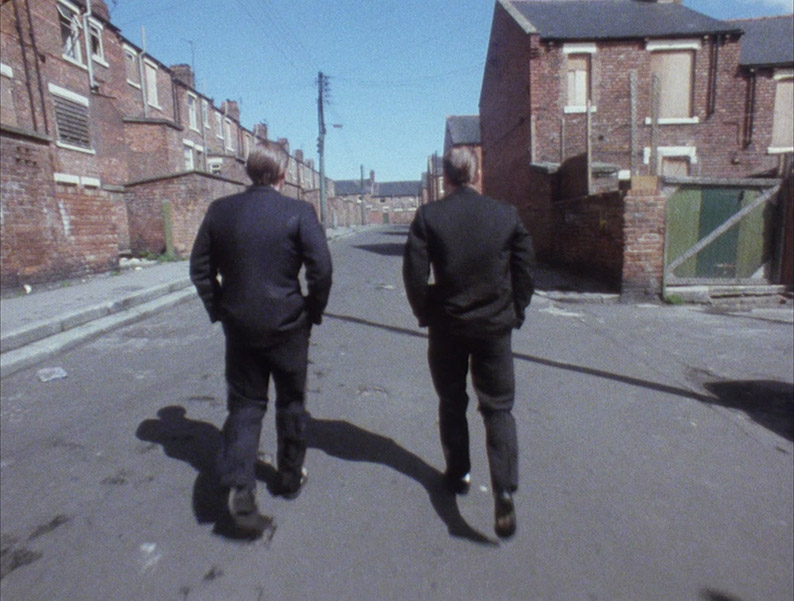
Road kicks off by introducing us to a number of local residents of this run-down estate as they prepare for an evening out, or in a few select cases spent firmly indoors. Cocky mates Brink (Neil Dudgeon) and Eddie (William Armstrong) are decked up to the nines and looking for action, while confidently tarting it up are Louise (Jane Horrocks) and her mouthy friend Carole (Mossie Smith). The older Jerry (Alan David) likes to reminisce about the way things used to be, while the twitchy Joey (David Thewlis) has holed himself up in a dilapidated house and is starving himself to death, much to the concern of the devoted Clare (Moya Brady). The shabby dance hall to which the would-be revellers are drawn also sees middle-aged and predatory Helen (Susan Brown) try her luck with a hopelessly drunk soldier (Tim Dantay), a seduction that reeks of desperation and soon descends into despair.
Here the camera itself becomes the narrator, pulling us into houses and gliding down streets with the characters as they converse with each other or talk to themselves or directly to the camera, busting a hole in the fourth wall in a manner that may tie the film to its theatrical roots but is never less than electrifying here. Propelled along by monologues or the rock 'n' roll bounce of Gene Vincent's Be-Bop-A-Lula, this seductive approach peaks in an extraordinary, 8-minute monologue delivered on the move in a state of extreme agitation by actress Lesley Sharp– on a technical level alone it's a staggering sequence, but the pain and torment it registers marks it as one of the finest in all of Clarke's career.
The location (a former mining town) is so much a character in this film that it's hard to imagine how it would have turned out if Clarke had been confined to the studio as originally dictated. Eerily devoid of life and with seemingly every third house either boarded up or abandoned, it helps create the sense of a world that only extends to the borders of this dying community, one whose residents are trapped under an invisible dome of economic and social abandonment and oppression.
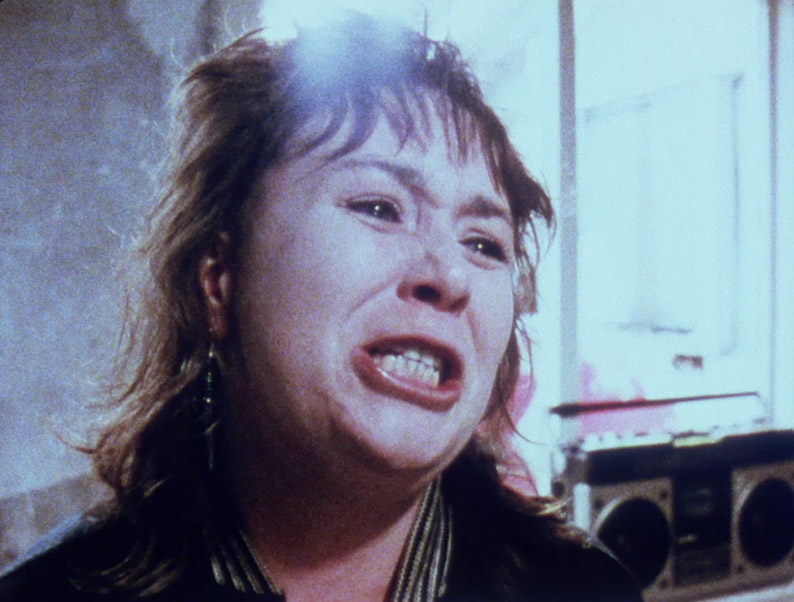
As with all of Clarke's best work (and there's so much of it), the performances are universally excellent across the board, but stealing the film for me is Mossie Smith, whose fiery defiance and explosive and contemptuous anger as Carole sets the screen alight every time she opens her mouth. Although downbeat in its subject matter and its reflection of the Thatcherite desolation of communities, the film is not without its moments of real humour, and the sheer energy with which it is made and performed give me with goosebumps on every viewing. It's an extraordinary work made at the tail end of an extraordinary career, one that leaves you aching for what Clarke might have gone on to achieve had his life not been cut so tragically short.
It's here that the quality of the 16mm image really starts to take a bump, quite possibly due to the arrival of better high-speed stock, though the mere fact that these are more recent films and have not been in storage for as long as the likes of Scum and Sovereign's Company is possibly also a contributory factor. This is immediately evident in Christine's almost pastel colour scheme, created in the costumes and decor of the houses but most attractively captured here. Minimal lighting and Clarke's desire to be able to point the camera in any direction does occasionally see our lead characters plunged into shadow or overexposed when they stand by a window, but this always feels more like an aesthetic choice than a fault, and is frankly preferable to a sudden, concentration-breaking f-stop shift in the middle of a long, hand-held scene. Grain is visible but the detail is good, the contrast range generous, and the image is spotless. Very nice. The soundtrack is very clean, but plays an almost supporting role here –footsteps and location ambience are more important than dialogue, and both are fine.
Road is also 16mm film and is of similar quality, albeit with a more striking use of colour and a number of scenes set in houses whose lighting ranges from bright window daylight to virtual gloom. Clarke and cameraman John Ward make vivid use of their location here – only in the final scene of cathartic emotional release does contrast harshen and the colour lose its punch, but somehow this just seems to serve the sequence. The dialogue is always clear, and Gene Vincent and the Nolans sound great.
Corin Campbell Hill and Sam Dunn Commentary on Christine
Assistant director of Christine Corin Campbell Hill rightly leads the way in this fascinating and information-packed look back at the film and its making. Areas covered include the young actors, difficulty of lighting for 360-degree shooting, the role played by the cartoons showing on TV in the background, how enjoyable Clarke was to work with ("He was so bloody funny!") and his passion for his craft, the decision to make the drug-taking feel like an ordinary and everyday activity, and so much more. She also reveals that they walked for miles during the course of making the film, with the walking shots requiring 10 to 15 takes apiece. A fine companion to the film.
David Leland Introduction on Road (2:31)
In a quietly passionate introduction from the BBC2 Alan Clarke season, Leland here outlines how Road came to be filmed on location, then attacks the then current government's policy of throwing the BBC open to market forces and ends with a plea to preserve and properly fund the corporation, which in the current climate couldn't be more timely.
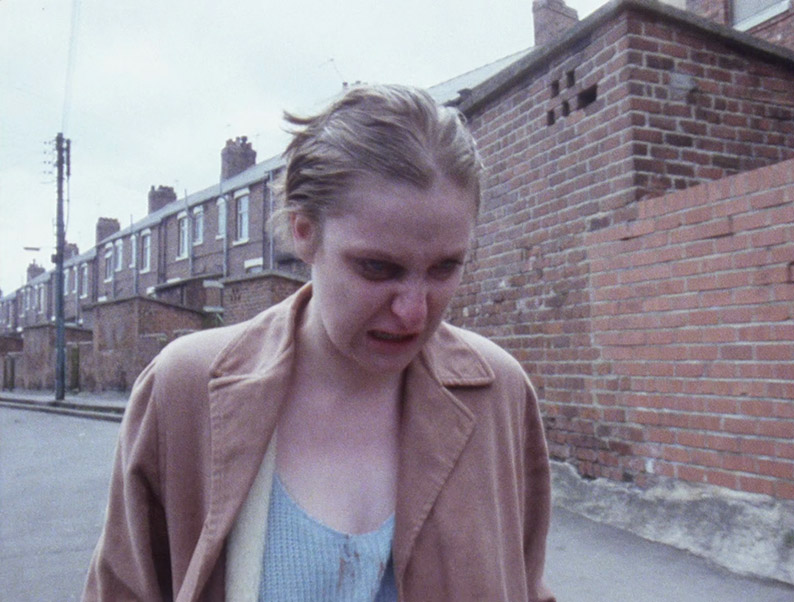
Corin Campbell Hill, Stuart Walker and Sam Hill Commentary on Road
Assistant director Corin Campbell Hill once again takes the lead here, revealing how an electricians' strike freed Clarke from having to shoot the film in the studio and commenting on the locations, working with the local residents, controlling the environment for shooting, John Ward's camerawork, the positive reception to the film, and plenty more. Production designer Stuart Walker provides some interesting insight into the use of colour and the specific decor or the house interiors, while in an intriguing aside, Sam Hill suggests that Danton's Death was actually an allegory about Clarke's relationship with the BBC hierarchy. Great stuff.
Open Air: Road Discussion (26:28)
In one of those points-of-view shows that always seemed to get up my hooter, an almost genteel Mossie Smith gamely fields calls from admirers and complainers following the film's first TV screening, while the dopey presenters claim they didn't understand the underlying message. Two young members of the programme's 'monitoring group' – both drama students – also get to ask Smith a couple of questions and later also seem to miss the point of the play. Alan Clarke and producer Andrée Molyneux respond to comments in the second half, with Clarke in particular really holding his own. He even gets to explain how a steadicam works.
Road: Deleted Scene (2:11)
A single-shot sequence involving a severely bruised Moya Brady lying down talking to an unconscious David Thewlis. Unfortunately the soundtrack has been lost and we thus don't get to hear what she says.
Alan Clarke on Location (Gallery)
A gallery packed with over 150 photos taken on location during the filming of Contact, Road and The Firm, all scanned in high definition. The shots of Clarke at ease really capture the feel of the jovial and immensely likeable man so many in the box set warmly recall.
Alan Clarke: Out of His Own Light (Part 11) (22:15)
The first half of this terrific segment of the documentary is given over largely to actor Vicky Murdock, who played the title role in Christine and here recalls the public outcry at the decision to show the characters actually injecting drugs, and talks about the ex-addict brought in to advise the performers, how the injection scenes were faked, and more. Editor Tariq Anwar recalls how Clarke used to drive him mad with his constant indecision about how long he should hold on specific shots, and Corin Campbell Hill chips in with a couple of observations about the film that are duplicated on the commentary track. In the second half, actor Lesley Sharp – who was in the original Royal Court stage production of Road– remembers shooting the 8-minute walking monologue in Clarke's film adaptation and how this transformed the scene from its physically static equivalent in the play. Cameraman John Ward explains how he came onto the project, how the electricians' strike moved it onto location ("there was a rumour that Alan had paid them to stay out"), and how attending the rehearsal helped him judge his camera movements and made him almost one of the cast. There's plenty more, too. Great stuff.
|